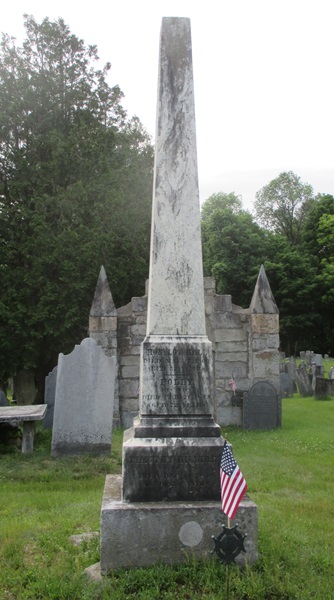Lot HALL
SAR Patriot #:
P-173132
The following information was assembled from numerous sources and cannot be used directly as proof of Qualifying Service or Lineage.
It is considered a research aid and is intended to assist in locating sources that can be used as proof.
State of Service: VT
Qualifying Service: Lieutenant / Prize Master
DAR #: A049346
Birth: 02 Apr 1757 Yarmouth / Barnstable / MA
Death: 17 May 1809 Westminster / Windham / VT
Qualifying Service Description:
- Lieutenant, Privateer "Eagle", Captain Elijah Freeman Payne, May 1776; captured 15 Sep 1776, prisoner at Scotland, exchanged fall of 1777
- Prize Master, ship "General Putnam", Capt Daniel Waters, service 10 July 1779 to 7 Sept. 1779 on the Penobscot Expedition
- Prize Master, privateer "Essex", Capt John Cathcart, 12 June 1780
Additional References:
- Halls of New England, Genealogical and Biographical, by Rev. David B. Hall, 1883, pg 241-243.
- Massachusetts Soldiers and Sailors in the War of the Revolution, Vol 7, pg 98
- Naval Documents of the American Rev., Volume 7, pg 688-689 (images 712-713)
- The Edinburgh Advertiser (Edinburgh, Scotland) 18 Oct 1776, pg 253, column 3.
- Pension W.19751.
- Muster/payrolls, and various papers (1763-1808) of the Rev. War (MA&RI) -Volume 40, pg 13, 112, 127b (images 331, 449,483)
Spouse: Mary/Polly Homer
Children: Daniel; Benjamin; Timothy; Mary; Timothy;
Members Who Share This Ancestor
None*
*This means that the NSSAR has no applications for this Patriot on file.
Instead the information provided is best effort, and from volunteers who have either researched grave sites, service records, or something similar.
There is no documentation available at NSSAR HQ to order.
Burial:
Location:
Westminster / Windham / VT / USA
Find A Grave Cemetery #:
Grave Plot #:
SE section--Row 4--Lot 108
Grave GPS Coordinates:
n/a
Find A Grave Memorial #:
Marker Type:
SAR Stake
SAR Grave Dedication Date:
bef 2011
Comments:
Directions to Cemetery / Gravesite:
